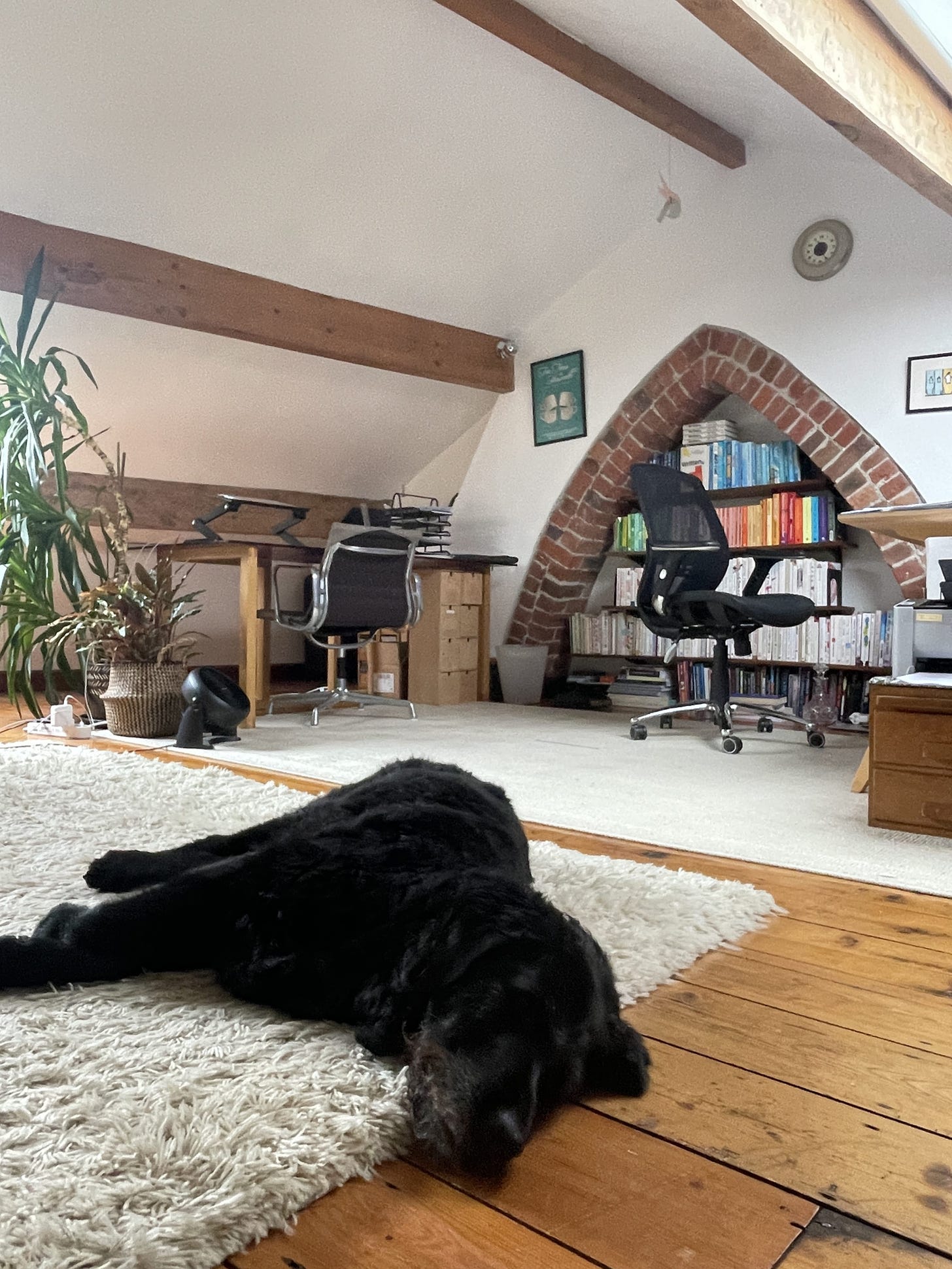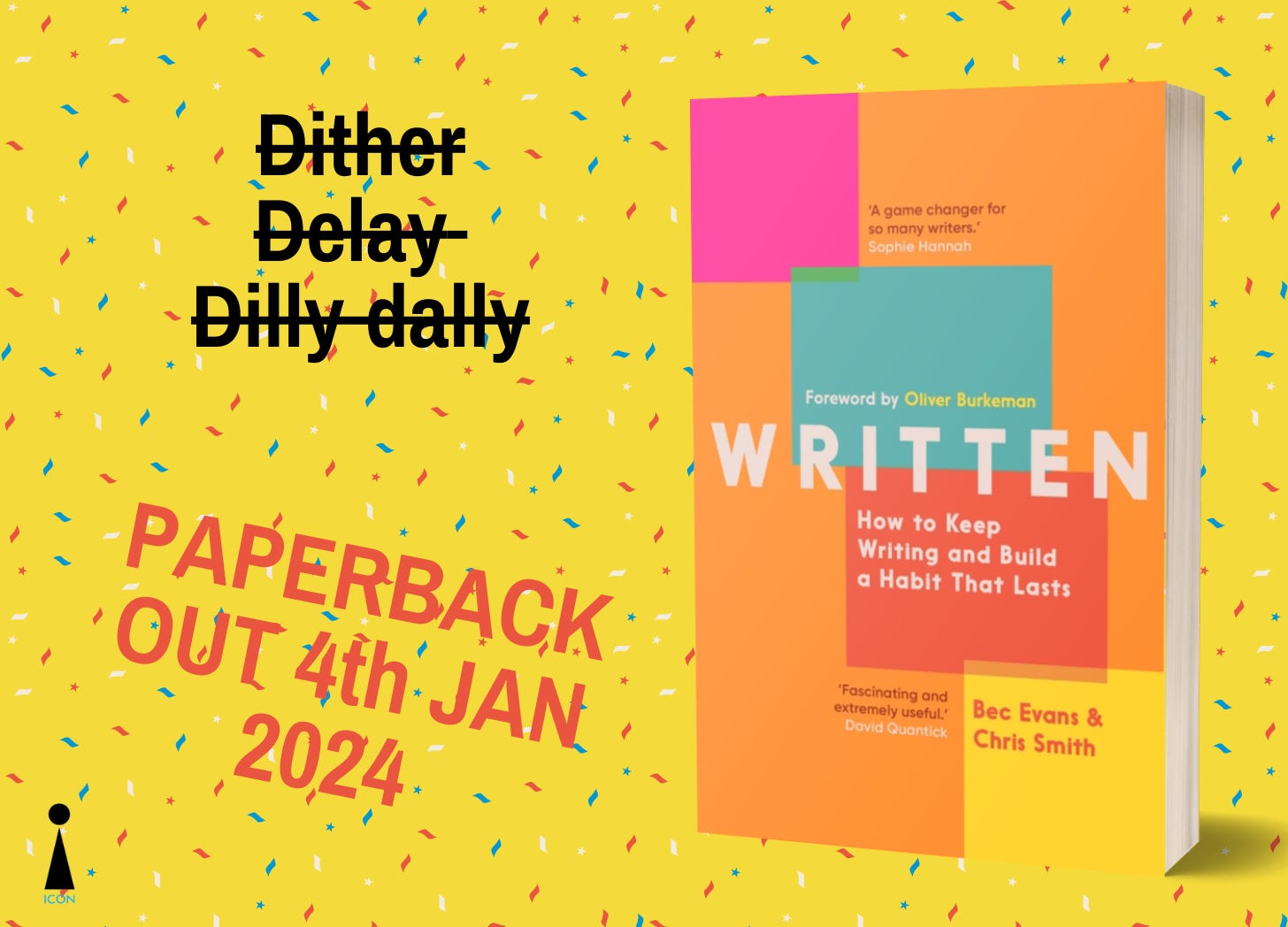Writing accountability - find your people preferences
A peek into where and how we write & why understanding your people preferences will help you get your writing done
Hello writing friend
A warm welcome to our writing room.
Chris and I write from the attic of our Victorian grit stone house. It’s a large-ish square room with an apex roof and Velux windows that let in too much sun in the summer and lets out all the heat in winter.
Five sturdy oak beams span the white-painted sloping ceiling. At the gable end of the room there’s an exposed brick arch where the chimney stacks join which we have filled with books.1 It’s the kind of thing an estate agent would call a ‘feature’.
My desk borders one side of the arch and I sit facing the back of the house, while Chris sits behind me, or I suppose in front, as he faces forward out front of the house. A towering Yucca from his university days sits beside him and across from the desks is an artfully distressed sofa where our Labradoodle, Peggy, sleeps if her elderly hips allow her to make it up the stairs.
How we write
We write in silence. For many years, the only noise we could tolerate was the sound of Peggy snoring, the volume of which has increased as her whiskery beard has greyed over the years. More recently we’ve been forced to cope with builders working at volume next door as they rebuild the mill destroyed by fire in 2022.
The revving of the generator, the reversing cherry picker and usual building bangs and crashes are OK - more difficult are Fridays when they’re partial to playing 80s hits and singing along to Tainted Love to mark the fast approaching weekend.
We both drink a lot of tea and coffee and take several breaks throughout the day. Exercise is essential for concentration and a midday walk or gym session is as important to our work as staring at the screen.2 But that’s where our writing similarities end.
My writing accountability
Over the years I have developed ways to support my writing. I love setting goals. I keep a writing tracker and reflection diary and find at least one good thing about my writing each day. And obviously I co-write with Chris - planning books, blogs and newsletters, and editing and rewriting each other’s work.
To keep me writing I need other people. Lots of them in lots of different ways. Here’s a selection of how they support me:
Telling my friends and family about my writing
Being held accountable to my plans with my kickass accountability group the 12-week warriors
Joining #100daysofwriting challenge on Instagram and sharing my writing progress (or lack of) with others in the community3
Booking sessions with Focusmate and joining online co-writing sessions with the London Writers’ Salon at Writers’ Hour
I love a writing date with friends and my go-to writing retreat is at Gladstone’s residential library
I’m a member of a novel critiquing group and share my work-in-progress for feedback
I attend writing classes to work on aspects of craft and learn from expert teachers
I paid for a structural edit of our book with particular focus on storytelling before we submitted to the publisher
And enlisted the support of beta readers to read early drafts
In 2021 I applied for and won a grant that supported my writing development and paid for writing time - thank you Arts Council England
Productivity is personal
And what does Chris use to keep him going?
Nothing. He sits, head down and writes - when the writing doesn’t come he gets annoyed and goes for a walk. When we were writing our book together he told no one, I think his friends are still surprised.
So why are we telling you this? Because what you do to get the writing done is personal to you. It will depend on your personality, preferences and lifestyle, what time you have to write and where you are in your project.
It will change over time, but testing out different accountability styles can give you a toolkit of tactics that will keep you going long term.
Your people preferences
Other people are crucial to my writing. It’s not as simple of whether you’re an introvert (both Chris and I score highly on the introversion scale) but whether having external accountability offers support to keep you to going or turns you off.
Figuring out your people preferences can have a big impact. Think back to when you achieved goal or changed behaviour in other areas of your life or work - what tactics did you use to help? Did you go it alone, find a buddy or join a group?
Come up with different ideas of how people can support your writing and find low-stakes ways to test them out.
Now if you’ll use excuse me, I’ve just had a ping from my calendar reminding me to join a writing date.
Keep going, Bec
Hardback available now in Amazon and in all good bookshops.
I organised the bookshelves by colour during the Covid lockdown as a pick me up - their rainbow spines still pick me up.
While we will walk together, often thrashing out ideas as we climb the hills around Hebden, we’ll never go to the gym at the same time, funny how these ‘rules’ emerge, but I swear it is a secret of happy relationships deciding what is shared and what is solo.
Read more about Jenn Ashworth and how she developed #100daysofwriting to hep her overcome a writing block.









A fellow doc student and I have 2 weekly appointments to write together. One at a local coffeehouse and another over Zoom. I have to act with thoughtfulness for them if I choose not to use that writing time. I am reinforced to write with them because we chat between pom sets. It has been very helpful as a person who is developing writing habits.
That was such a validating discovery for me - I’m much more people oriented (though paradoxically also an introvert), so I need my tribe.